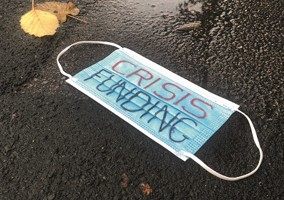Change is coming. Or is it?
After 12 months where fundraising targets were decimated and operating models disintegrated overnight, where entire teams were furloughed and charity staff and leaders cut their own pay to make ends meet, you hear it all around: the sector is changing, it will change, it has changed.
But many of us have been here before. After the 2009 financial crash, through the years of austerity as many charities’ income fell or became more constrained through a shift from grant to contract funding, the expectation of radical change in the sector was a constant. However, that major change never really materialised.
Instead over the last ten years change forced itself upon charities as the tectonic plates of the public sector and the private sector shifted. Charities - which often appear to hold in common only the fact that they are neither private sector nor public sector organisations - have had little agency in that change. The way we lead, fund, deliver and govern ourselves has been in response to the changes around us. And, as charities are so wildly varied, any change impacts charities in very different ways.
Now, in the turbulent wake of the global pandemic, charity leaders are raising our heads from the desk and asking ourselves ‘what next?’ ‘How will things change?’ But unless we seize this opportunity as a sector, the sector is unlikely to change significantly and in a way that benefits our work.
Contradictory expectations
That’s because it’s so difficult for us to change.
In 2019, after several years leading small, local charities, I began to question myself and my colleagues in the sector about how we were responding to the changing world around us.
There were several prompts for me to do this. One was a horrifying, increasing awareness of the climate crisis, another was a creeping realisation of the immense change that the digital fourth industrial revolution is about to have on all our lives, and the impact that each of these is likely to have on the most vulnerable in our society. I also read a brilliant blog by the Heron Foundation’s Clara Miller in which she, with the cool eye of an outsider, points up the weirdly elaborate ties that bind us in the charity sector.
The more I looked at what charities hope to achieve in their missions and the way we were set up to do this, the more frustrated I felt that we, as charity leaders, were being asked to do an impossible task. As a sector we are so tangled up in the contradictory expectations about what we do that, even where we can see clearly what needs to change, there are secure ties that bind us to the status quo.
I set about identifying and researching all the ties that bind us as a sector: our restricted funding, our arcane governance, our paltry training, our restricted pay and I explored the origins and the impacts of each of these. This was a fascinating journey in the liminal areas between academic research and the experience of the reality of the sector, of myself and many colleagues and experts. The result was my book, published at the end of July by Routledge and supported by the Centre for Charity Effectiveness.
What I discovered in writing this was a sector still full of life and ambition, but held back by some of its underlying philosophy. At its heart I explored a disconnect between our emotional and practical expectations of charities. While I don’t come up with a prescription to cure our ills as a sector I hope the book will air the experiences of real charity leaders running real charities today, charities of a range of types and sizes, and I hope that together we can start a conversation about our future.
In my view the charity sector is perfectly placed, in theory, to respond to some of the immense issues that face us over the coming decades. But in order to respond in practice we need as a sector to focus relentlessly on our own vision of what we want to be and to release ourselves from some of the baggage of the past that holds us back.
Sarah Mitchell is chief executive of Cycling UK
Related articles












